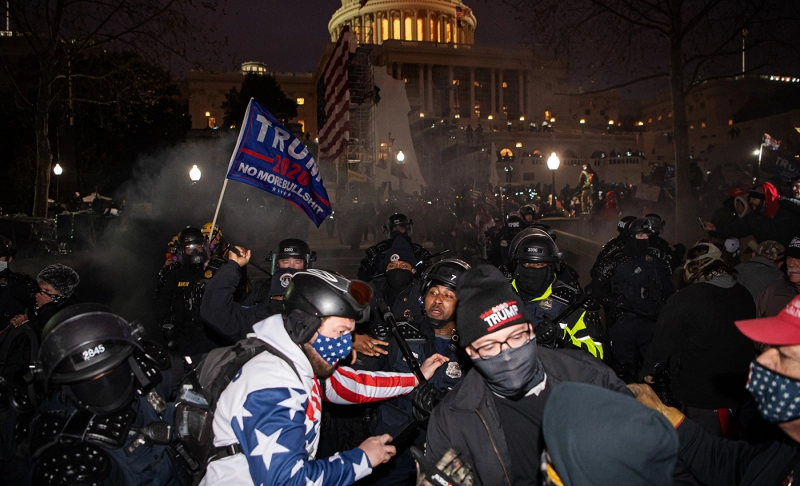By: Ankita Kulkarni
March 8 2021
True: The FBI shared prior intelligence on a possible attack at the Capitol Hill with the Capitol Police.

The Verdict True
The FBI had sent an email about possible violence at Capitol Hill that went unnoticed by the officials.
The FBI had sent an email about possible violence at Capitol Hill that went unnoticed by the officials.A group of pro-Trump supporters stormed the US Capitol Building in Washington DC on January 6, 2021. The mob attacked the building to stop the proceedings to certify President Joe Biden’s victory in the elections. The angry mob turned violent leaving five people dead and many injured. The Capitol Police were outnumbered as thousands of rioters lay siege of the building. In the aftermath, investigations have been launched into how law enforcement failed to protect the building. The Washington Post reported that an FBI office in Norfolk had prepared a document, a day before the Capitol Building attack, warning about the possible violence. According to the statement recorded by FBI Director Christopher Wray, testifying before the Senate Judiciary Committee, the FBI bulletin of January 5 was shared within an hour of receiving it to all the law enforcement partners, which include the US Capitol Police, the U.S. Park Police, DC police, and other federal and local agencies. It was verbally communicated by the FBI's command post in the bureau's Washington field office and was then shared through a portal accessible by law enforcement around the country. But the information contained was "raw" and "unverified." However, former US Capitol Police Chief Steven Sund stated that none of the intelligence they received depicted the actual insurrection. Sund noted that the email did not reach his hand before the attack, and he was not privy to the information from the FBI Norfolk office. Following, Acting Metropolitan Police Chief Robert Contee also testified that the FBI had sent his department an email warning of potential violence on January 5. He stated that "I would certainly think that something as violent as an insurrection in the Capitol would warrant, you know, a phone call or something." According to NBC, New York police sent law enforcement agencies across the country — including Capitol Police — an intelligence packet describing threats and violent rhetoric on social media in the weeks and days leading up to the rally, multiple senior law enforcement officials said. The NBC further reported that the "FBI even visited more than a dozen extremists already under investigation to urge them not to travel to Washington". Furthermore, there was a lot of evidence on social media prior to the attack. In December, a digital flyer made public on Instagram, and Facebook referred to what would happen as "Operation Occupy the Capitol." On the fringe message board 8kun, which is popular with QAnon followers, users talked for weeks about the Capitol siege. "You can go to Washington on January 6 and help storm the Capitol," an 8kun user said Tuesday, a day before the siege. "As many Patriots as can be. We will storm the government buildings, kill cops, kill security guards, kill federal employees and agents, and demand a recount." A private intelligence report issued in December, obtained by NBC News, said the "'million-MAGA march' in Washington DC on January 6 is the next major flashpoint ... the mass event (which will be held in the National Mall and outside the Capitol) is likely to spark street violence, some of which may be lethal, between Antifa and Trump supporters or far-right groups." All this evidence listed above has made many questions why the FBI, Homeland Security, and other agencies didn't do more to ensure the Capitol was protected.


